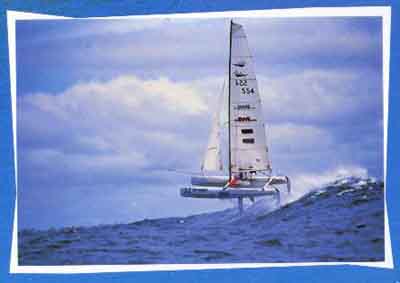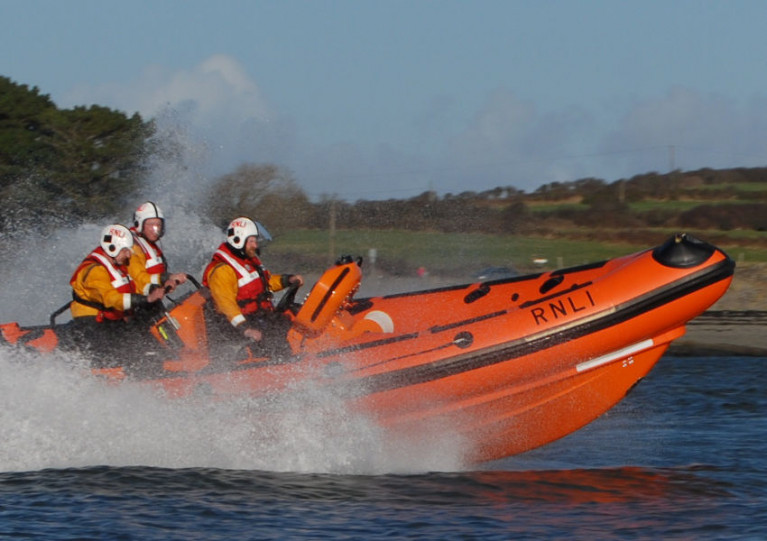Displaying items by tag: Catamarans
Kilrush Lifeboat Launches to Capsized Catamaran in Shannon Estuary
Kilrush RNLI’s volunteer crew were called out yesterday morning (Sunday 8 November) to a report of a capsized catamaran drifting near Corlis Point on the Shannon Estuary.
The lifeboat crew launched within minutes of the 11.30am call and quickly reached the five-metre sailing catamaran on the Co Clare shore of the estuary.
Due to technical issues, the two on board the catamaran were unable to right the vessel and were drifting with the tide.
Both were found to be unharmed, and the lifeboat crew assisted in righting the vessel before escorting it back to Poulnasherry Bay, from where it had launched.
This was the second callout of the week for Kilrush RNLI, who previously launched on Wednesday (4 November) to a speedboat which was adrift between Glin and Tarbert on the Shannon Estuary and was a danger to navigation. Volunteers located and towed the vessel, which had no occupants, to Tarbert Island.
Charlie Glynn, Kilrush RNLI helm, says: “During Covid-19 restrictions, Kilrush RNLI’s readiness to launch has not changed and [we] continue to be fully operational and on call 24/7.”
Irish Multihull Association
Cat Classes Sailed in Ireland
Racing Classes
Dart 18 – Blessington SC, Ballyholme YC, Swords S&BC
Dart 16 – Blessington SC, Ballyholme YC, Galway Bay SC, Swords S&BC, Mullingar SC
The Dart 16 and Dart 18 performance catamarans are raced in Irish Clubs by crews of all ages and are also ideal for fun 'off the beach' sailing. The Dart 16, with its furling jib and quickly reefed mainsail, is perfect for safe fun sailing.
Irish International Dart Association, c/o Marjorie Mangan, Secretary, 47 Willington Crescent, Templeogue, Dublin 6w. Tel: 01 456 5060, email: [email protected]
Hurricane 5.9 – Swords S&BC, Blessington SC, Ballyholme YC
 Left: A Dart Hawk
Left: A Dart Hawk
Formula 18 – Dart Hawk, Blessington SC; and Hobie Tiger, Royal Cork YC, Galway Bay SC, Blessington SC
Spitfire – Blessington SC, Ballyholme YC
Shadow – Blessington SC, Galway Bay SC
A-Class – Royal Cork YC
Hobie 18 and Hobie 16 – Blessington SC, Ballyholme YC, Swords S&BC, Galway Bay SC
Hobie have something to suit everyone, from youth to Adults, beginners to high performance racing – a double-handed and single-handed class for the more adventurous. Racing is available at home and there's a strong International circuit in Europe. Cruising, the class have been known to make the occasional coastal voyage from Cork to Glandore and Cong to Galway. Cruising around Belfast Lough
Irish Hobie Class Association, c/o Yvonne Sheehan, Secretary, Avonmore, Cork Road, Mallow, Co Cork. Fax: 087 747 6051, email: [email protected]
Multihull Cruisers – Racers
Catamarans and Trimarans over 20ft (6m)
In the mid-80s there was a growing fleet of Cruiser-Racers between 22ft and 35ft. These catamarans and trimarans raced at Multihull events with the smaller racing catamarans, usually racing on a longer offshore course.
Some were damaged in Hurricane Charlie and the fleet dispersed in the late eighties. There are quite a few of the larger catamarans and trimarans in clubs around the Country.
We would like to establish contact with the owners of these Multihulls with a view to keeping a database of these boats and hopefully, organising some events, maybe in conjunction with one of the events on the Catamaran Racing Calendar. This could take the format of a Rally, perhaps with some handicap racing.
If you have a Cruising or Racing Multihull over twenty feet in length, based in Ireland, please email us at [email protected] or telephone 353 1 4565060.
If you have stories and photos of your cruises and trips around Ireland or abroad, we will print them on this page.
We hope for a good response and we will keep our website page updated.
(Above information courtesy of the Irish Multihull Association)
Graham Smith wrote, in Afloat's March 2009 issue: "There are 43 multihulls – comprising various catamaran types – racing actively in Ireland in six locations, statistics which confirm that there has been a small increase over the past year and underlining the ongoing passion which the multihullers have for their particular branch of the sport.
Almost half of them made it on average to the five regional events held during the season, which saw four different winners. Andrew Gallagher of Royal Cork ended up as National Champion in a 25-strong fleet on his home territory, having also won the Easterns on Dublin Bay with crew Jimmy Nyhan.
Clubmate Rob Doyle won the Southerns (also at RCYC) and Blessington’s Simon Kearns took the Western title, but 2008 was otherwise the year of the Ballyholme pairing of Adrian and Mike Allen. Together they won the Northerns and Inlands but also had the distinction of topping the leaderboard at the Brightlingsea Open British Hurricane 5.9 event. National Champion: Andrew Gallagher and Jimmy Nyhan, Royal Cork YC"
Irish Multihull Association, c/o Yvonne Sheehan, Secretary, 'Avonmore', Cork Road, Mallow, Co. Cork. Tel: 087 7476051
There is a space for Irish boating clubs and racing classes to use as their own bulletin board and forum for announcements and discussion. If you want to see a dedicated forum slot for your club or class, click here






























































